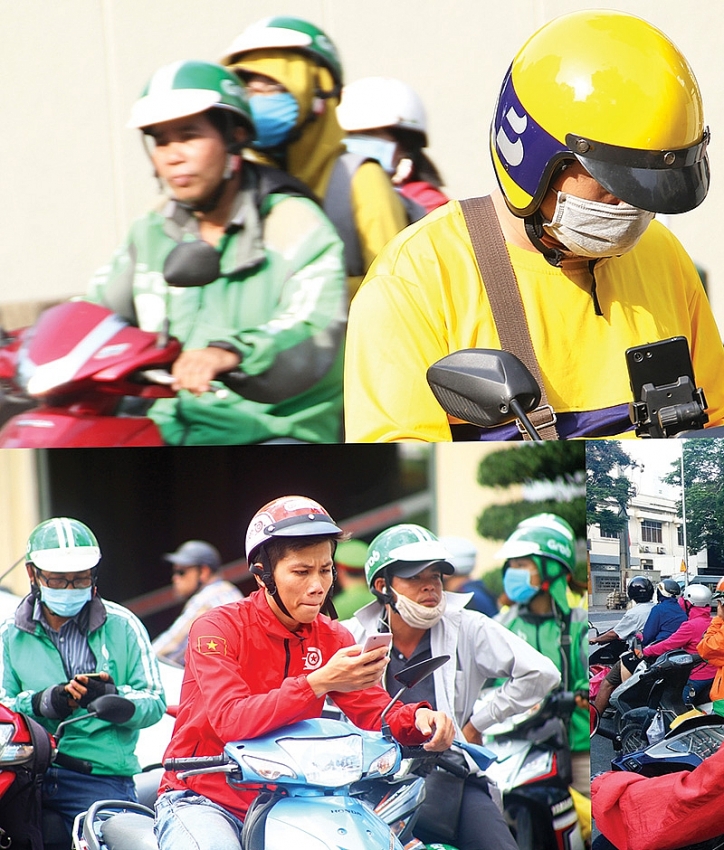Super-apps here to stay
 |
| More businesses are anticipating a future cashless society, Photo: Le Toan |
As technology transforms the national economy, one trend is gaining more attention. Many tech startups have received billions of US dollars of investments in various fields, in order to become super-apps in Vietnam.
After taking the country by storm with their ride-hailing apps, the likes of Grab and Go-Viet have unveiled ambitions of transforming into providers of multi-purpose super-apps. As these apps offer a broader range of services such as ride-hailing and food delivery, several SMEs have a chance to join up with the platforms to access millions of customers.
After making a local debut in Vietnam last year, GrabFood has already grown 23-fold in delivery orders, making Vietnam the second-fastest growing market for food delivery in the region. The number of merchant partners has increased four times to serve surging demand. Thanks to the platform, these brick-and-mortar outlets can set up an online presence to increase their sales.
Rajiv Chandna, head of Business Development and Strategy at Grab Financial, said, “Vietnam remains one of the key markets for Grab, and has greatly contributed to the fast-paced development of the firm over the past few years.”
With large swathes of the country’s population without a bank account and with limited access to credit cards, Grab indentified a niche to grow a fintech platform. In doing so, it teamed up with Moca to facilitate a plan.
Chandna added that a cashless society will become a reality sooner or later, and these expected changes have prompted Grab Financial to increase its investment in the sector. Since then, the number of cashless transactions on its platform has grown 370 per cent year-on-year.
To become a super-app, Grab received investment and formed partnerships with global industry leaders such as Toyota, Hyundai, Microsoft, and Mastercard. Last month, Grab secured over $4.5 billion in funding in its latest financing round from Softbank Vision Fund. The group intends to use the funds to advance its super-app vision in Southeast Asia.
Though its open platform strategy, Grab works with partners to provide safe, accessible and affordable transport, food, package, grocery delivery, mobile payments and financial services to millions of people in Southeast Asia. Grab aims to create 100 million micro – entrepreneurs though its ecosystem. In Vietnam, Grab’s super-app serves one in every five Vietnamese each month. So far, over 175,000 driver partners have joined its ride-hailing platform to earn more income.
Competitor Go-Viet, the Vietnamese subsidiary of Indonesia’s Go-Jek, has also jumped on the bandwagon. The company currently offers motorbike hailing (Go-Bike), food delivery (Go-Food) and consumer-to-consumer delivery (Go-Send) in Vietnam. During its beta launch in Vietnam last year, Go-Jek undercut Grab’s fares and promotions. The firm quickly gained market share, however, it is now facing a growth challenge with many complaints from drivers. Some drivers even quit when the company introduced a commission rate of 20 per cent (it was initially zero).
The CEO and another top-level executive of Go-Viet have already resigned over this issue, according to sources familiar with the company. The change of top-level personnel also raises questions about the sustainable development of the company.
Despite its super-app vision, Go-Jek only picked up $100 million in fresh capital as part of its ongoing Series F funding round in March, where the company aims to raise at least $2 billion. The latest influx of cash has come from existing investor Astra International, an Indonesian conglomerate.
In the long term, super-apps are likely to infiltrate everyday life, as well as media headlines. Analysts also believed that they can transform the way business is conducted in Vietnam, particularly in the era of Industry 4.0.
What the stars mean:
★ Poor ★ ★ Promising ★★★ Good ★★★★ Very good ★★★★★ Exceptional
Related Contents
Latest News
More News
- State corporations poised to drive 2026 growth (February 03, 2026 | 13:58)
- Why high-tech talent will define Vietnam’s growth (February 02, 2026 | 10:47)
- FMCG resilience amid varying storms (February 02, 2026 | 10:00)
- Customs reforms strengthen business confidence, support trade growth (February 01, 2026 | 08:20)
- Vietnam and US to launch sixth trade negotiation round (January 30, 2026 | 15:19)
- Digital publishing emerges as key growth driver in Vietnam (January 30, 2026 | 10:59)
- EVN signs key contract for Tri An hydropower expansion (January 30, 2026 | 10:57)
- Vietnam to lead trade growth in ASEAN (January 29, 2026 | 15:08)
- Carlsberg Vietnam delivers Lunar New Year support in central region (January 28, 2026 | 17:19)
- TikTok penalised $35,000 in Vietnam for consumer protection violations (January 28, 2026 | 17:15)

 Tag:
Tag:




















 Mobile Version
Mobile Version